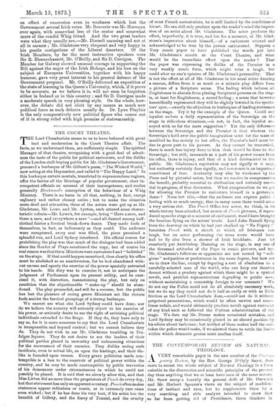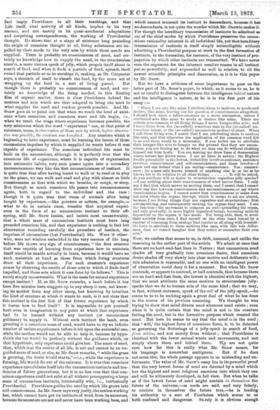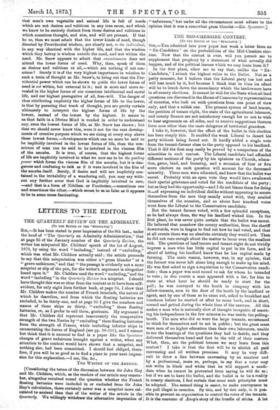THE C TE3IPORARI REVIEW ON NATURAL THEOLOGY.
AVERY remarkable paper in the new number of the Cou!cei- porary Review, by the Rev. George D'Oyly Snow, does more to recast the whole subject of Natural Theology in a form suitable to the discoveries and scientific principles of the present day than anything that we at least have seen of the same nature. Mr. Snow accepts heartily the general drift of Mr. Darwin's and Mr. Herbert Spencer's views on the subject of modifica- tions of instinct and race, but he supplements them by a very searching and able analysis intended to show that so far from getting rid of Providence, those thinkers iu fact imply Providence in all their teachings, and that Life itself, vital activity of all kinds, implies in its very essence, and not merely in its quasi-accidental adaptations and - surprising correspondences, the working of Providential thought. He shows that at a stage of existence long preceding the origin of conscious thought at all, living substances are im- pelled by their needs to the very ants by which those needs are supplied. There is probably no consciousness of need, and cer- tainly no knowledge how to supply the need, in the structureless amceba, a mere viscous speck of jelly, which propels itself about in search of food, and when it finds a particle of food, spreads itself round that particle 130 as to envelope it, making, as Dr. Carpenter says, a stomach of itself to absorb the food, by the mere act of wrapping up the food in a sort of living parcel. But though there is probably no consciousness of need, and cer- tainly no knowledge of the thing needed, in this floating film of organic matter, there is clear Providence behind the motions and acts which are thug adapted to bring the need to what supplies the need and renders growth possible. And Mr. Snow goes on to point out that when we reach the level of exist- ence where sensation and conscious want and life begin, i.e., when we reach the stage where experience becomes possible, the very minimum which the word " experience" can, at that point of existence, mean, is observation of those acts by which, before observa- tion was possible, the creature was benefited. Any creature which is beginning to have experience, must be learning the lesson of those unconscious impulses by which it supplied its wants before it was capable of experience. The conscious individual life must be built on the unconscious, although it is perfectly true that the conscious life of experience, where it is capable of organisation into automatic habits, very soon passes again into a secondary unconsciousness very like the first unconsciousness of instinct. It is quite true that after having learnt to walk or to read or to play on the piano, we can walk and read and play with almost as little consciousness as that with which we breathe, or cough, or sleep. But -though so much conscious life passes into unconsciousness again, both in regard -to the individual and the race ; though it is quite true that races of animals after being taught by experience, —like pointers or setters, for example,— what to do in certain cases, transfer that acquired experi- ence in the form of an unconscious instinct to their off- spring, still Mr. Snow insists, and insists most unanswerably, that a whole mass of unconscious instincts must have long preceded conscious life, and that experience is nothing in fact but observation recording carefully the procedure of instinct, the impulses of unconscious (but Providential) life. Were it other- wise, were not wisdom embedded in the very essence of life long before life shows any sign of consciousness, " the first creature that was capable of learning from experience how to maintain itself would be unable actually to learn, because it would have no such materials at hand as those from which living creatures draw all their experience. For each creature's experience comes by observing the results of those acts to which it finds itself impelled, and those sets which it sees done by its fellows." This is surely simply unanswerable. What is the basis for animal experience except instinct ? If, as Mr. Snow remarks, a lamb before it has been five minutes born staggers up to any sheep it sees, not know- ing its mother from any other sheep, but knowing by intuition the kind of creature at which it wants to suck, is it not clear that this instinct is the first link of that future experience by which it learns how to feed itself ? It is impossible to put yourself back even in imagination to any point at which that experience had to be learned without any instinct (or unconscious guidance) to supply it. Without such instinct the lamb, even granting it a conscious sense of need, would have to try an infinite number of useless experiments before it hit upon the successful one, while the mother would not be able to help it, because by hypo- thesis she too would be perfectly without the guidance which, on that hypothesis, only experience could give her. The sense of need, then, which is at the source of all life, is not and cannot be an un- guided sense of need, or else, as Mr. Snow remarks, " while the grass is growing, the horse would starve,"—i.e., while the experience is forming, life would die out of the universe. It is true that conscious experience consolidates itself into the unconscious instincts and ten- dencies of future generations, but it is no less true that that con- scious experience could not exist at all without presupposing a large mass of unconscious instincts, intrinsically wise, i.e., intrinsically Providential. Providence guides the need by which life grows into self-consciousness. As Mr. Snow says very justly, the sexless working bee, which cannot have got its instincts of work from its ancestors, because its ancestors are not and never have been working bees, and which -cannot transmit its instinct to descendants, because it has no descendants, is not quite the wonder which Mr. Darwin makes it. For though the hereditary transmission of instincts be admitted as one of the chief modes by which Providence preserves ∎the uncon- scious rationality inherent in all individual life, yet thathereditary transmission of instincts is itself simply unintelligible without admitting a Providential purpose at work in the first formation-of instincts, in the formation, for instance, of the very instinct of pro- pagation by which other instincts are transmitted. We have never seen the argument for the inherent creative reason in all instinct put so powerfully, and expounded so well in relation to all 'the newest scientific principles and discoveries, as it is in this paper by Mr. Snow.
But we have a criticism of some importance to pass on the latter part of Mr. Snow's paper, in which, as it seems to us, he is not so careful to distinguish between the intelligence behind nature and the intelligence in nature, as he is in the first _part of his essay:— "When I see acts like mine, I attribute them to motives, to needs and desires, like mine, leaving out the question of consciousness altogether. I should look upon a fellow-creature as a mere automaton, unless I attributed acts like mine to needs or desires like mine. There are certain acts common to all living things, I mean hunger-like acts; and I trace these from the (so-called) conscious man to the (so-called) un- conscious infant, or the (so-called) unconscious mollusc or plant. When I call these living acts, I assert that I am attributing them to motives like ours, and that otherwise the application of the common word life to us and them would be a misnomer. If you forbid me to attribute their hunger-like acts to hunger on the ground that they are uncon- scious, you are forcing me to do what no man can do without shutting himself out from truth. You are making me draw lines of demarcation where nature has drawn none. I see no lines in nature : the Highest dwells potentially in the lowest, irritability involves sentience, sentience involves consciousness and self-consciousness, and these involve--'I know and can defend what I am saying--omniscience. Yes : omnisci- ence ; for a man only knows himself or anything else in so far as he knows his or its relation to all other things It will be asked, do you attribute will or desire to structuroless organless jelly specks? —I say nothing about their consciousness of what moves them. I only say I find that which moves us moving them, and I assert that I cannot draw any line between consciousness and unconsciousness, or say where consciousness begins. I cannot assert that consciousness or sense does not exist where the organs through which it seems to act are absent, because I see living things that are organless and structureless ; first extemporizing, and subsequently making the organs they need. I see the function—the movement to compass an end—preceding the organ, and only gradually, in more highly organized beings, becoming entirely dependent on the organs it has made. Not being able, then, to sever their activity from ours, I find myself on the other hand forced by a current of reasoning from analogy that carries us all along with irresisti- ble force to attribute to them motives like ours, with this sole differ- ence, that we cannot imagine that they notice or remember their own acts."
Now, we confess that seems to us, in drift, unsound, and unlike the reasoning in the earlier part of the article. We admit at once that there are no hard-and-fast lines in Nature ; that unconscious need shades off very gradually into conscious desire, that conscious desire shades off very slowly into clear motive and deliberate will ; this admission is reasonable, and no one with an intelligent power of observation could deny it for a moment. But when Mr. Snow contends, or appears to contend, or half contends, that because there are no hard-and-fast lines, the lowest is identical with the highest, that we must attribute the same motives to structureless
jelly- specks that we do to human acts of the same kind ; that we may, in fact, without unreason, speak of the will of the jelly-speck,—he seems to us to be undoing again a great deal of what he has done in the course of his previous reasoning. We thought he was trying to show that mind directs need wherever need exists ; even when it is quite certain that the mind is not in the creature feeling the need, but in the formative purpose which created the need. But here he seems to say that the mind is in the need ; that ' will,' the highest form of conscious force, is to be detected as governing the fiutterings of a jelly-speck in search of food, from within, and not merely from without ; that Providerice is identical with the lower animal wants and movements, and not simply above them and behind them. W, are not quite sure how far this is really what Mr. Snow means, for his language is somewhat ambiguous. But if he does not mean this, the whole passage appears to us misleading and un- fortunate. The value of Mr. Snow's essay lies in its powerful proof that the very lowest forms of need are directed by a mind which has the highest and most religious emotions into which they can and will be ultimately developed, in full view. But when he talks as if the lowest forms of need might contain in themselves the future of the universe,—as seeds are said, and very falsely, to contain in themselves the future tree,—he is lending his authority to a sort of Pantheism which seems to us both confused and dangerous. Su rely it is obvious enough that man's own vegetable and animal life is full of needs which are not desires and volition in any true sense, and which we know to be entirely distinct from those desires and volitions in which conscious thought, and aim, and will are present. If that be so, then we must admit that the lower kinds of need, though directed by Providential wisdom, are clearly not, to the individual, in any way identical with the higher life, and that the wisdom which they betray is wisdom outside the need, and not within the need. Mr. Snow appease to admit that consciousness does not attend the lower forms of need. Why, then, speak of them as desires and volitions at all,—which are nothing if not con- scious ? Surely it is of the very highest importance iu relation to such a train of thought as Mr. Snow's, to bring out that the Pro- vidential power which can be shown to guide the lower forms of need is not within, but external to it ; and is more and more re- vealed in the higher forms of our conscious intellectual and moral life, and our highest prerogative of all, free-will. The danger of thus attributing implicitly the higher forms of life to the lower, is that by pursuing that track of thought, you are pretty certain ultimately to interpret the highest forms of life by the lowest, instead of the lowest by the highest. It seems to us that faith in a Divine Mind is needed in order to understand any, even the lowest forms of life, as Mr. Snow has shown ; but that we should never know this, were it not for the vast develop- ments of creative purpose which we see rising at every step above these lowest forms, —developments which can no more be said to be implicitly involved in the lowest forms of life, than the con- science of man can be said to be involved in the viscous film of the amoeba. It is true, of course, that the highest forms of life are implicitly involved in what we now see to be the guiding power which forms the viscous film of the amoeba, but it is dan- gerous and confusing to talk as if it were involved in the film of the amoeba itself. Surely, if desire and will are implicitly con- tained in the irritability of a wandering cell, you may say with- out any further error that God is implicitly involved in zero, —and that is a form of Nihilism or Pantheism,—sometimes one and sometimes the other,—which seems to us as false as it appears to be in some sense fascinating








































 Previous page
Previous page